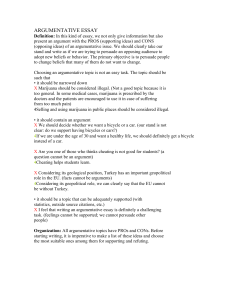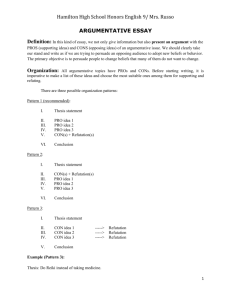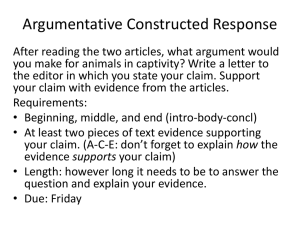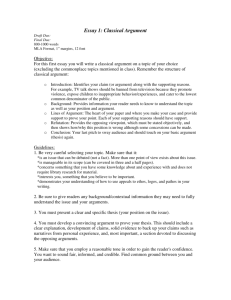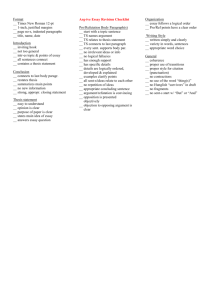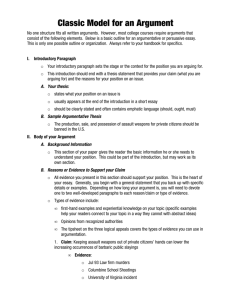Argumentation
advertisement
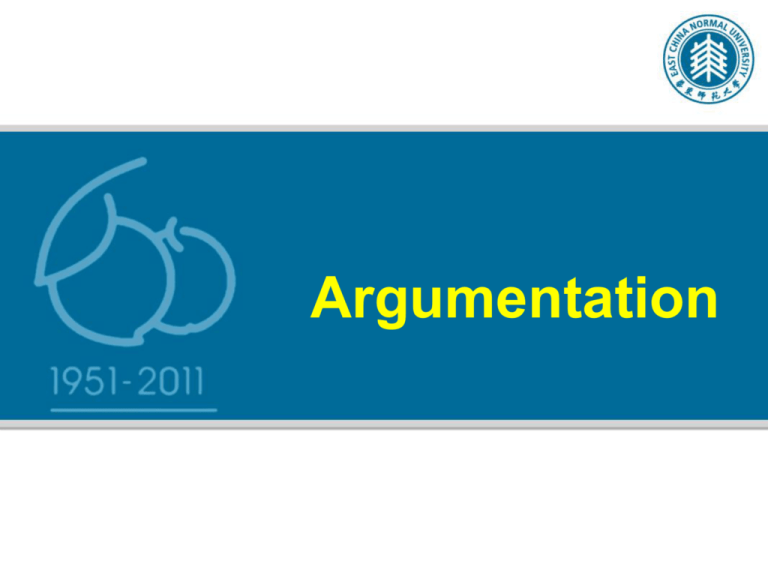
Argumentation Warm-up • Death penalty is still practiced worldwide, but it is not without controversies. Are you for or against death penalty? Why? Nature of argumentative essay 1. To present an opinion to the reader. 2. To explain, clarify, and illustrate that opinion. 3. To persuade the reader that your opinion is valid. a. to move the reader to action; b. to convince the reader that the opinion is correct or c. to persuade the reader that your opinion is at least worth considering. Types of writing Narration Description Exposition Argumentation Purpose To tell a story To describe To inform To convince Tone More emotion More matterof-fact More academic or explanatory More argumentative Development By time By space By general logic By deduction or induction Content Narration often involves description. Exposition often includes description and narration. Argumentation often involves explanation. Exposition vs. Argumentation • While an expository paper makes known something and explains it to make the reader understand, an argumentative essay tries to make the reader agree with its point of view and support it, to persuade him to change his mind or behavior, and to approve a policy or a course of action that it proposes. Speeches on polices, editorials of newspapers, articles on political or theoretical questions, and various proposals are often argumentative. • Argumentation frequently makes use of the other three types of writing — description, narration, and above all exposition, for argumentation and exposition are very closely related— argumentation is actually exposition with the additional purpose of convincing or persuading. What it involves What it aims at Expo 1.Presenting a point of view sition 2. Explaining, clarifying, and illustrating the point of view Getting readers to understand the point of view Argu 1. Assuming controversy ment 2. Presenting a point of view ation 3. Explaining, clarifying, and illustrating the point of view 4. Supplying proof for the point of view 5. Refuting opposing viewpoints 1. Convincing readers that the point of view is sound 2. Encouraging readers to accept the point of view, and/or 3. Encouraging readers to take action Argumentation or Exposition • • • • • • • • • Examination – Harmful or Useful? My Views on Examinations Which Weighs More – School Brand or Major? Why I Came to College Should Class Attendance Be Required? Laid-off Workers Have to Face Reality Internet – a Coin of Two Sides Internet – the Indispensable of Our Life Should Euthanasia Be Legalized? A E A E A E E E A Steps in writing an argumentative essay • To decide basically what your opinion/standpoint is on the question. • To think what the main points of your argument (PROs) would be and try to find evidence to back up your points, • To note down counter-arguments (CONs) and contradictory evidence. • To present both sides of the argument (PROs and CONs) in a logical, coherent manner and clearly mark the shift from the opposing argument to your own supporting argument. Notes: • You should make completely clear where you stand. Don’t “sit on the fence” and take an indecisive approach. • Your argument must be well-balanced and recognize different opinions and approaches. • In an argumentative essay, the conclusion is probably the most important part, so don’t make it too short. How to write a good argumentation? • • • • • • • • Argumentation ≠ Quarrel A debatable point Sufficient evidence The logical appeal The emotional appeal Essential elements Outline of a proposition argument Fallacies in argumentative writing 1. An honest and friendly attitude • To argue is not to quarrel. The force of an argument does not come from abuse, sarcasm, exaggeration, or fierce attacks, but from solid evidence, logical reasoning, and careful analysis. A domineering or hostile tone could only raise doubts about your good faith and impair the credibility of your argument, whereas an honest and friendly attitude will help win the trust of your readers. • Take care that you neither overstate or understate, and avoid overuse of such words and phrases as “perhaps”, “maybe”, “sometimes”, “most often”, “nearly always,” “I think “, “in my opinion”, which invariably weaken the force of your argument. 2. A debatable point • It is imperative that the paper should have a debatable point, that is, something which can be viewed from more than one angle and is therefore open to dispute. Generally speaking, the following are not good themes: Mere statements of facts Statements of personal taste Viewpoints that can be readily verified Examples • 1) Mere statement of facts. – “Chinese doctors use acupuncture anesthesia(针 刺麻醉) to perform certain operations.” – “Acupuncture anesthesia should replace conventional anesthesia in all operations.” Examples • 2) Statements of personal preference – “Ba Jin is my favorite author.” – “Ba Jin is the greatest Chinese writer of the 20th century.” Examples • 3) Viewpoints that are generally accepted or can be easily verified – “Noise pollution is harmful to people’s health.” – “Noise pollution is the most harmful of all environmental pollution.” Are they debatable? 1. 2. 3. 4. 5. 6. Computers and automation increase unemployment. Smoking is harmful to people’s health. Plants produce oxygen that the world needs to sustain life. Shakespeare died in 1616. Every student should be required to become computer literate. Computer courses are boring. How to write a debatable thesis statement • topic + your position/stand • topic + opposing arguments + your position/stand Although many young people would agree that those who are old enough to vote, fight, and die for their country are old enough to drive responsibly, the drinking age should remain twenty-one because of the dangers of alcohol-related accidents and the lack of alcohol education programs. Practice: Topic: owning a gun • Opposing arguments • Your position/stand (CONs): (PROs): • Owning a gun is a • The presence of a gun necessary step for in the home increases security of property the chances of accidental deaths, and self-defense. suicides, and homicides. • Although some argue that the presence of a gun in the home increases the chances of accidental deaths, suicides, and homicides, owning a gun is a necessary step for security of property and self-defense. • Although some argue that owing a gun is a necessary step to the security of property and selfdefense, the presence of a gun in the home increases the chances of accidental deaths, suicides, and homicides. 3. Sufficient evidence • Examples: concrete, illustrative, representative • Facts: readily accepted, be based on personal observation • Statistics: avoid presenting a long list of figures • Authorities: those who are experienced and knowledgeable in certain fields Some faulty supports we should avoid: • Thesis: Leaving the university and starting to work is good for the adolescent. • 1. Feelings, emotional arguments – It makes one feel much better. • 2. Irrelevant examples (wandering off the topic) – He would then be able to take his girlfriend to expensive restaurants. • 3. Oversimplification – Only then would he understand what it means to be an adult. • 4. Hasty generalizations – It is a widely known fact that all adolescents look forward to earning money. • 5. Unreliable, even false outside sources – According to www.doubtme.com, 80% of working men wish they quit school when they were at university and started working at an earlier age. 4. The logical appeal • From the least important to the most important • From the most familiar to the least familiar • From the easiest for the reader to accept or comprehend to the most difficult Inductive Reasoning • When you use induction, you start with facts and proceed from facts to a general conclusion. In other words, you move from specific examples to a general statement. • From specific to general Deductive Reasoning • The process is just the opposite of inductive reasoning – it moves from a general statement to a specific conclusion. It works on the model of syllogism ([逻]三段论法, 推论法, 演绎)– a threepart argument in which there are two statements, known as the major premise前提 and the minor premise, and a conclusion. • From general to specific Examples Major premise: Big cities can be dangerous. Minor premise: New York is one of the big cities. Conclusion: New York can be dangerous. Or Major premise: All human beings make mistakes. Minor premise: X is a human being. Conclusion: Therefore, X makes mistakes. Or Major premise: People can’t be trusted. Minor premise: Jerry is a person. (Faulty syllogism) Conclusion: Jerry can’t be trusted. 5. The emotional appeal • An effective emotional appeal can be made in four common ways: • Showing empathy: – Identify with the reader’s feelings and express real interest in their interest. • Showing respect for views other than yours: – The purpose is to win readers to your side. By showing respect for the merit in their position, you are decreasing readers’ resistance to your own position. Besides, it also proves that you understand that no arguable position is absolutely right. • Maintaining a moderate tone: – The purpose of doing this is to ease any potential attack on your argument. • Using vivid examples: – The purpose is to attract the attention of readers to the issue you are discussing. 6. Essential elements • • • • The issue The claim The support The refutation A. The issue • A controversy, a problem, or an idea about which people disagree and hold different points of view. – Smoking should be banned in workplace. – The greenhouse effect has significantly affected the environment. – “Home” means different things to different people. – More effective measures should be adopted to crack down on(处罚、制裁) cyber crime. – There should be stricter laws against fishing in city canals. – Competent teachers shouldn’t be forced to retire at age 60. B. The claim • the point of view the writer tries to prove about the issue, usually the writer’s view on the issue. • Tips on how to make a claim: – Be sure that the claim – what you are trying to prove – is clearly stated, preferably at the beginning of your paper. – When necessary, define terms that may cause confusion before making a claim. – Qualify a claim of fact, when necessary, with a word such as generally, usually, probably, or as a rule, that limits the claim, e.g. Generally, college graduates earn more than high school graduates who didn’t go to college. – In the case of claims of value, adhere to the values you defend. – State a claim of policy with a word such as should or must. C. The support • ---The three common types of support are reasons, evidence and emotional appeal. – Reasons: general statements that back up a claim, explaining why a viewpoint on an issue is reasonable or correct. Reasons should be logical (i.e. making sense) and reasonable (i.e. fair) • Evidence: what writers use to support or verify reasons. Evidence should be – relevant (i.e. appropriate to the case in hand) – sufficient (i.e. as much as you need to verify a reason) • Emotional appeal: which evoke the needs or values that readers care deeply about. – appealing to needs – appealing to values Types of evidence exemplified: • Claim: Reading aloud to preschool and kindergarten children improves their chances of success in school. • Facts: e.g. First-grade children who were read to as preschoolers learn to read earlier than children who were not read to. • Statistics: e.g. A 1998 study demonstrated that reading aloud to children produced a 16 percent improvement in the children’s ability to recognize words used in a story. • Expert opinion, e.g. Dr. Maria Morealle, a child psychologist, urges parents to read two or three children’s stories to their children daily. • Examples, e.g. Stories about unfamiliar places or activities increase a child’s vocabulary. For example, reading a story about a farm to a child who lives in a city apartment will acquaint the child with such new terms as barn, plow, and tractor. • Observation from personal experience, e.g. When I read to my three-year-old son, I notice that he tries to repeat words. D. The refutation • recognizes / acknowledges and argues against opposing viewpoints. • Guiding principle: finding a weakness in the opponent’s argument. • Eg. – by casting doubt on the opponent’s reasons; – by questioning the accuracy, relevancy, and sufficiency of the opponent’s evidence (facts, examples, statistics and expert testimony) Structure of the refutation: • Briefly acknowledge the opposing views. • Then respond and point out why it/they is/are wrong. 7. Organization of an argumentation • All argumentative topics have PROs and CONs. • Three possible organizational patterns: A University in Every Town • However, while the already existing 85 universities are wrestling with financial and academic difficulties, it does not Thesistostatement: seem to be a good idea to add new universities the system of higher education. • First of all, the new universities will experience staffing PRO idea 1: problems. • In addition to recruitment problems, small town universities PRO idea 2: will have financial difficulties. • It is argued that the establishment of a university in a developing town will contribute to the development of local CON Refutation: culture, community and economy. However, if a+university is wrestling with staff recruitment problems, or if it cannot solve its financial difficulties it means that it cannot be of any help to the local community or economy either. On Student Lovers’ Living Together • According to official statistics, the number of college student lovers living together off campus in Beijing has increased by four times between 1997 and 2001. This is undeniably true of many other places in China. Although many students do not strongly object to it, I don’t think it is advisable for college student lovers to live together away from campus. • Some lovers say that living together can help them study better, for it can help them get rid of the interference of other students. This is actually not true. When living away from campus, the lovers will always think of each other rather than the teachers’ assignment, and other unavoidable family chores such as cooking and washing will also take much time away that might have been spent on study. Besides, many courses now require group work or cooperation. If they stay away from other classmates, how can they study these courses well? • Some lovers say that living together can relieve their loneliness and pressure, but it is not really the best choice. On the one hand, the real reason for their loneliness is that they are not focusing their mind on study. Study, the most important task for university students, can prove to be fascinating if you really focus on it./ On the other hand, even if their loneliness is real, there are many better ways to deal with it./ For instance, they can find friends to take part in sports or other entertaining activities. By staying away from other classmates, living together can be a source of rather than solution to loneliness. • Other lovers argue that they mean to get married after graduation, and this experience can help them test each other to see if they are suitable for married life. But this mentality does not hold water. The two lovers may really love each other, but living together can actually spoil a good relationship, because it enters into weakness rather strength, doubt rather than conviction. / A follow-up study shows that few couples living together really end in marriage. • In a word, those student lovers cannot find enough reasons to justify their choice. What they can offer all represent self-deception or misconception(错误想 法). Although universities are not allowed to forbid students to live off campus, they can still find more effective ways to convince this lost group of disadvantages, and improve teaching and after-class activities to attract them back to campus. On Student Lovers’ Living Together • According to official statistics, the number of college student lovers living together off campus in Beijing has increased by four times between 1997 and 2001. This is undeniably true of many other places in China. Although many students do not strongly object to it, I don’t think it is advisable for college student lovers to live together away from campus. • Some lovers say that living together can help them study better, for it can help them get rid of the interference of other students. This is actually not true. When living away from campus, the lovers will always think of each other rather than the teachers’ assignment, and other unavoidable family chores Refutation: such as cooking and washing will also takeCON much+time away that might have been spent on study. Besides, many courses now require group work or cooperation. If they stay away from other classmates, how can they study these courses well? • Some lovers say that living together can relieve their loneliness and pressure, but it is not really the best choice. On the one hand, the real reason for their loneliness is that they are not focusing their mind on study. Study, the most important task for university students, can prove to be CON fascinating if you + Refutation: really focus on it./ On the other hand, even if their loneliness is real, there are many better ways to deal with it./ For instance, they can find friends to take part in sports or other entertaining activities. By staying away from other classmates, living together can be a source of rather than solution to loneliness. • Other lovers argue that they mean to get married after graduation, and this experience can help them test each other to see if they are suitable for married life. But this mentality does not hold water. The two lovers may really each other, CONlove + Refutation: but living together can actually spoil a good relationship, because it enters into weakness rather strength, doubt rather than conviction. / A follow-up study shows that few couples living together really end in marriage. • In a word, those student lovers cannot find enough reasons to justify their choice. What they can offer all represent self-deception or misconception(错误想 法). Although universities are not allowed to forbid students to live off campus, they can still find more effective ways to convince this lost group of disadvantages, and improve teaching and after-class activities to attract them back to campus. • Pattern 1: Thesis statement: PRO idea 1 PRO idea 2 CON(s) + Refutation(s) Conclusion • Pattern 2: Thesis statement: CON(s) + Refutation(s) PRO idea 1 PRO idea 2 Conclusion • Pattern 3: Thesis statement: CON idea 1 ----->Refutation CON idea 2 ----->Refutation CON idea 3 ----->Refutation Conclusion Example: Childcare CON Idea 1 • It has been argued that children who attend childcare centers at an early age miss out on important early learning that occurs in parent-child interaction. Refutation • However, childcare centers may actually assist children in their early learning. They give children an opportunity to mix with other children and to develop social skills at an early age. Indeed, a whole range of learning occurs in childcare centers. • CON idea 2 • Another argument against the use of childcare facilities is that children can be emotionally deprived in these facilities compared to the home. • However, parents and children need to spend some time apart. Moreover, children become less dependent on their parents and parents themselves are less stressed and more effective care-givers when there are periods of separation. Providing Opposing Arguments • It is important to include opposing arguments to show your reader that – you have considered both sides of the argument; – you are able to anticipate and criticize any opposing arguments before they are even stated. Refuting opposing arguments: • Before we start saying that the opponents are wrong, we should specify their opposing ideas. • E.g. Some people may say that adolescents should not leave university education; however, they are wrong. • (What they say is not wrong. Maybe their supporting idea is wrong /irrelevant /insufficient. We should state their supporting idea specifically to be able to refute it.) • Some people may say that adolescents should not leave university education because they are not physically and psychologically mature enough to cope with the problems of the real world. However, they forget one fact: adolescents can vote or start driving at the age of 18 (in some countries even before that age!), which proves that they are considered physically and psychologically mature at that age. • When stating specifically why they think like that: – They put forward this idea because … – They claim that … since … Strategies used in refuting the opposing idea: • To compromise but prove that their argument is not powerful enough: – They have a point in thinking like that… – To a certain extent they are right… • To completely disagree: – After seeing this evidence, there is no way we can agree with what they say. • To say that their argument is irrelevant to the topic: – What we are discussing here is not what they are trying to prove. – Their argument is irrelevant. • Avoid overusing “perhaps, maybe, sometimes, most often, nearly always, I think, in my opinion”. They will weaken the force of your argument. Thesis: Do Reiki instead of taking medicine. Counter arguments People should trust medicine since it is effective and scientifically proven. Refutation --> Reiki is also scientifically proven and does not have side effects. (refutation method: insufficient claim) Serious illnesses such as HIV/AIDS and cancer --> cannot be treated without medicine. Reiki, like alternative --> healing methods, requires a lot of time. Medicine also cannot treat serious illnesses if not diagnosed at an early stage. (refutation method: opponents are partially correct) Reiki requires less time if done regularly. (refutation method: opponents are completely wrong) Fallacies in argumentative writings • • • False analogy Circular argument A loose argument • To be successful, your argument /position paper should present: – A thorough understanding of the issue; – A clear, specific thesis; – A focused argument that effectively supports your thesis; • Clear topic sentences which state exactly what body paragraphs intend to accomplish; • Credible, relevant source material which supplements and assists your argument; • Parenthetical documentation which clearly cites all quotes, summaries, and paraphrases from your source material; • No logical fallacies. Teenagers and jobs • Outline: – Thesis:____________________ – Body: • Point 1______________________ • Point 2______________________ • Point 3______________________ – Conclusion Ban the things. Ban them all. • Are you in support of private gun ownership? Why or why not? • What is the 2nd Amendment about? • What is the writer’s thesis? How did she support it? • Is there any problem in her reasoning? Practice • Death penalty • Gun ownership • Writing assignments 1, 2, 3 Thank You!

